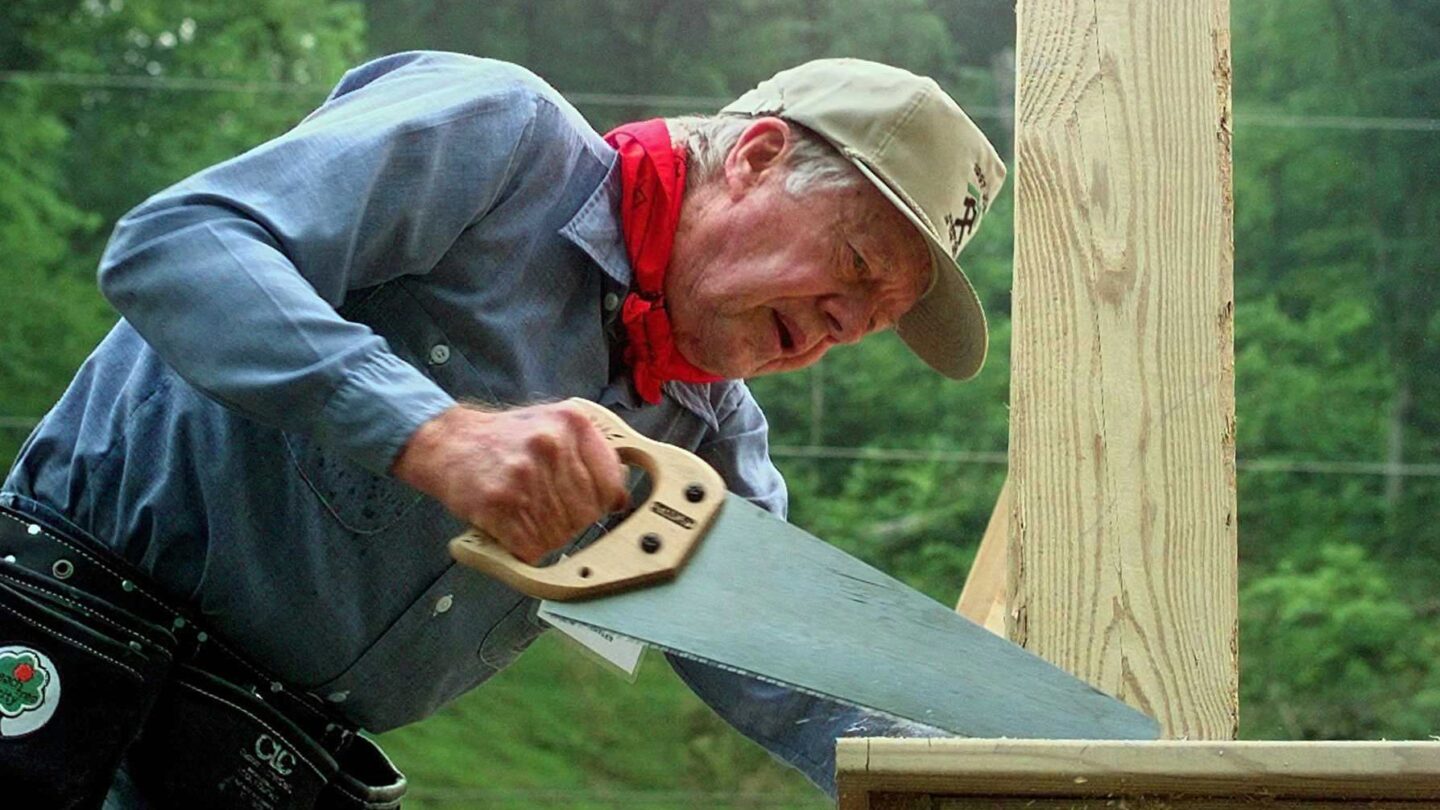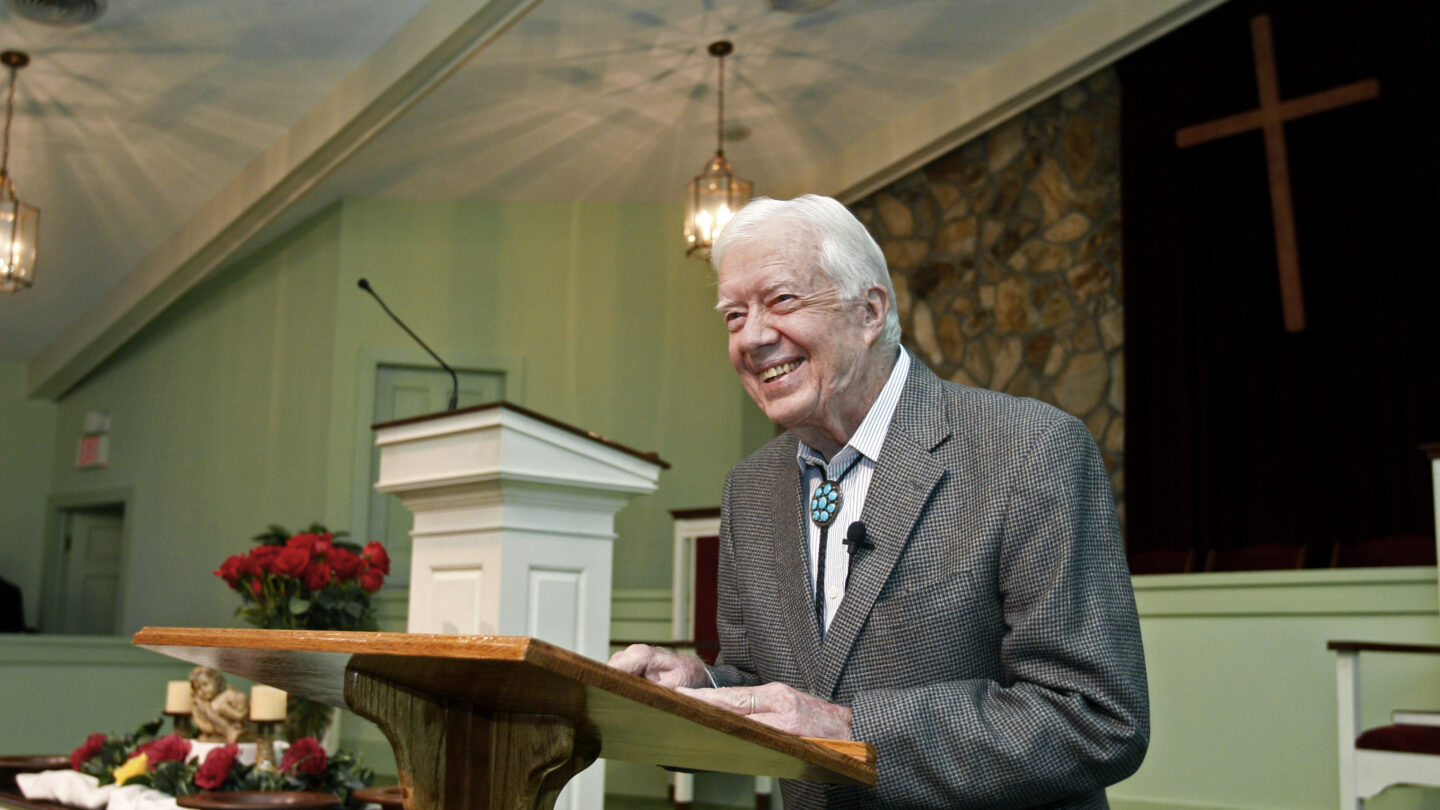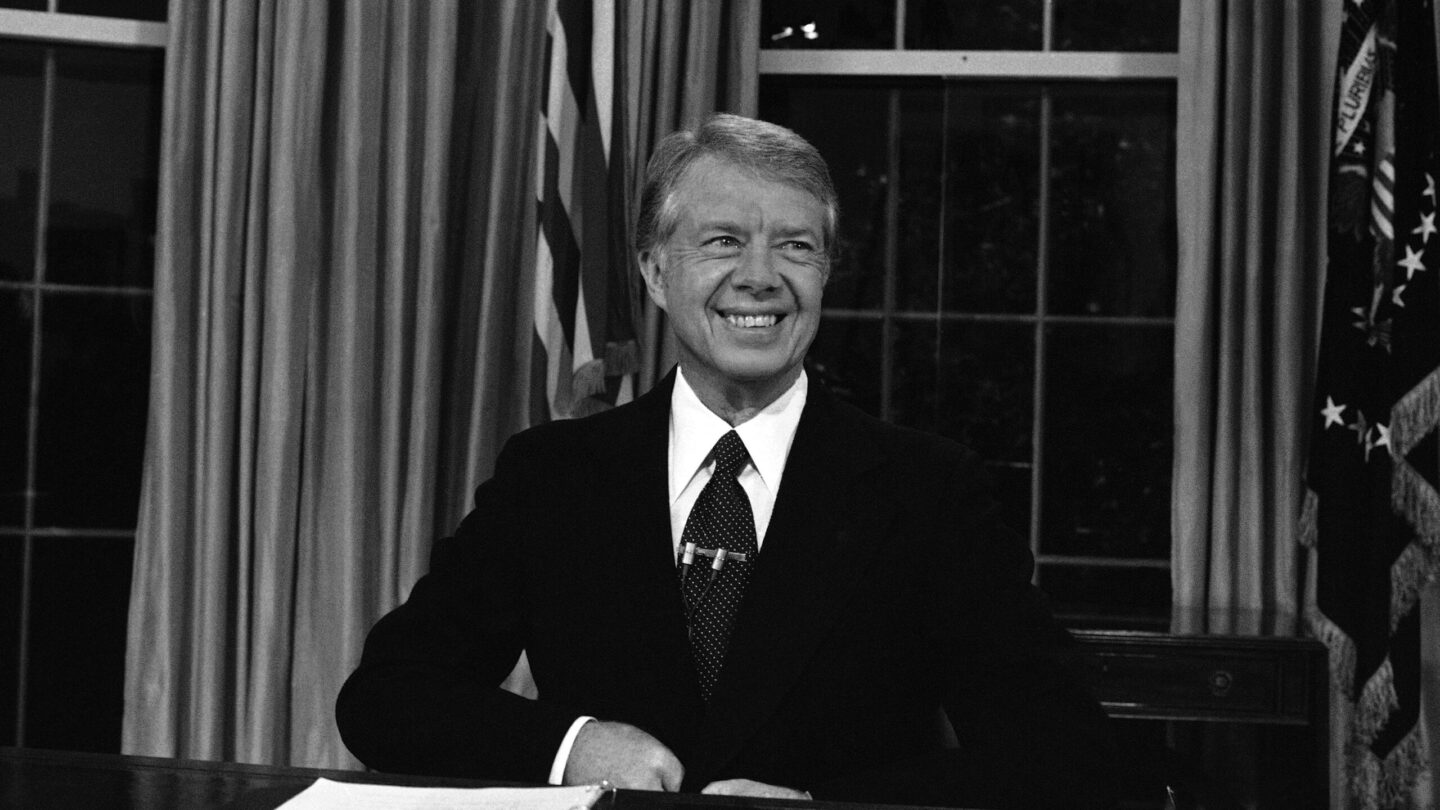James Earl “Jimmy” Carter Jr., the nation’s 39th president and the only Georgian to ever serve in the White House, has died at age 100.
Carter, a native of Plains, Georgia, served as a naval officer, a Georgia state senator, as Georgia’s 76th governor from 1971 to 1975, and as U.S. president from 1977 to 1981.
While Carter’s time in the White House ended without reelection amid the Iran hostage crisis and a conservative wave led by Ronald Reagan, his wide-ranging work and public service post-presidency have arguably set him apart. He received the Nobel Peace Prize in 2002.
Jimmy Carter was the eldest son of Lillian and Earl Carter. His wife of 77 years, Rosalynn died on Nov. 19, 2023. He is survived by their four children, Jack, Jeff, Chip and Amy
Early Years
Jimmy Carter and Rosalynn Smith, also of Plains, married in 1946 at ages 21 and 18, respectively. They met through Carter’s younger sister while he was still a naval cadet.”The best thing I ever did was marrying Rosalynn,” Carter said in 2015. “That’s the pinnacle of my life.”

Then-Georgia state Sen. Jimmy Carter hugs his wife, Rosalynn, at his Atlanta campaign headquarters on Sept. 15, 1966, after making a strong showing in the Democratic primary election for governor of Georgia. (AP Photo)
Their early marriage was spent traveling with Carter’s naval assignments, including in Norfolk, Va. and Pearl Harbor, Hawaii.
After his father’s death in 1953 Carter resigned from the Navy. The family moved back to Plains so they could manage his father’s farm supply and peanut farming business.
Carter served on the county’s library board and school board as the county dealt with resistance to desegregation. He also served on the local hospital authority before ultimately following his father’s footsteps into the state legislature. Carter won a seat to the Georgia State Senate in 1962, setting the stage for an internationally-significant political career.
1977 to 1981
“[Jimmy Carter] is, in my opinion, the most accomplished one-term president in American history,” said Stuart Eizenstat, former policy adviser to Carter and a Carter biographer. He spoke to the Council on Foreign Relations in 2018.
Eizenstat pointed out that Carter’s policy accomplishments included deregulation of the country’s transportation system, the Panama Canal Treaty, significant energy legislation, normalization of relations with China and “the greatest single act of personal diplomacy in presidential history of the entire country,” the Camp David Accords between Egypt and Israel.
Carter also developed a reputation as a leader on environmental issues. He installed the first solar panels on the White House roof in 1979 and, through the Alaska National Interest Lands Conservation Act, set aside 57 million acres as wilderness, an area larger than the state of California.
“We doubled the size of the National Park Service and we tripled the size of the Wilderness Areas in America in that one bill,” Carter remembered in 2010.
“And although I was very unpopular then in Alaska because the [Alaskan] senators had convinced them I was taking away Alaska lands, it’s now become one of the most popular things that I did, even with Alaskan people because they see how much it’s meant to their state,” he said.

“There were failures,” Eizenstat said, referencing the Iran hostage crisis and the loss of the 1980 election, “but they have overshadowed these really lasting and major accomplishments.”
Eizenstat also highlighted that Carter appointed more women and minorities to federal judgeships and senior positions than all his predecessors combined.
Carter himself had pointed out another distinction of his administration: that the U.S. was at peace for all four years of his service, a rarity in American history.
“Although we went through four years of extreme tension and I would say sometimes political confrontations, I was able to go through my four years and we never dropped a bomb, we never launched a missile, we never fired a bullet,” Carter said in 2010.
Carter Center
Carter’s active 40-year post-presidency saw further accomplishments and redefined the role of a former president.
He was a prolific writer of more than 30 books and had been a professor at Emory University in Atlanta since 1982. The Carters partnered with Emory that same year to found the Carter Center, the not-for-profit that has been the center of their work. Its priorities have included resolving conflict, promoting free and fair elections, increasing awareness of mental illnesses, protecting human rights and eliminating diseases.
“Their work ethic is just phenomenal. They never stop,” said Jill Stuckey of Jimmy and Rosalynn Carter in a 2019 interview. Stuckey is a longtime Carter friend who also serves as superintendent of the Jimmy Carter National Historic Park in Plains.
“I just wish everybody … would do some homework and just look at what all the good that they have done for this world,” Stuckey said.
The Carter Center is largely credited with the near-eradication of Guinea worm, though progress has slowed in recent years. The organization has also done significant work in combatting river blindness, a parasitic infection that can cause an eye disease often leading to permanent blindness.
The center has focused on ensuring free and fair elections around the world, in part because Carter won his first political race for the Georgia Senate after challenging illegal voting in his South Georgia election.
“I had some trouble in Quitman County down around Georgetown,” Carter recalled to the Georgia state Legislature in 2003, “126 people voted against me alphabetically, a number of them in prison or dead.”
The Carter Center has monitored more than 100 elections around the globe since 1989.
Habitat For Humanity
The Carters have also played a foundational role in the growth of Habitat for Humanity International, a nonprofit that builds housing for people in need.
They have volunteered on Habitat builds for more than three decades, including their 36th in 2019 in Nashville, Tennessee.

When asked at that Nashville event about what he hoped would be his legacy, Carter responded, “I’d say peace and human rights and treating everybody the same has been what I hope will be my legacy. Along with Habitat, proving that I wanted to help other people.”
Jonathan Reckford, chief executive officer of Habitat for Humanity International, said the Carters’ name is entwined with that of the organization.
“One of the great myths is that President Carter started and runs Habitat. If you did word association and said, ‘Habitat for Humanity,’ the next thing that comes out of most people’s mouths is, ‘President Carter,’” he said.
“And, in fact, while [the Carters] didn’t found it, I think they have been responsible in so many ways for the world finding out about it,” he said.
Carter called volunteering for Habitat “one of the best ways to practice my faith as a Christian.”
Faith And Plains
That faith was another signature of Carter’s life, as was Plains. He grew up attending church every Sunday at Plains Baptist Church, where his father was a deacon and a Sunday School teacher.
Carter himself taught Sunday School almost his entire life, most notably at Maranatha Baptist Church in Plains most Sundays beginning after he left the White House in 1981.
Particularly since Carter’s cancer diagnosis in 2015, his regular Sunday lessons drew hundreds of visitors, many of whom began camping out overnight to reserve seats in the church.
“[The Carters] live a wonderful life of serving, and they, every day of their life, try to uphold the Christian values that they deeply believe in,” said Stuckey in 2019. She also attends Maranatha Baptist Church.
“People see the work that he does with the Carter Center with eradicating of diseases … and that Mrs. Carter does with mental health issues, and they want to be around them,” she said of the high interest in visiting Maranatha.
“This is the only place that I know of that you can be around a former President of the United States,” she pointed out.

The Carters’ return to Plains and continued investment in the town after their time in the White House have made a major impact on the South Georgia town’s economy.
His presidential campaign headquarters sat on the town’s Main Street and is today a museum, part of the about 70-acre Jimmy Carter National Historic Site, which also includes his boyhood farm and the Carters’ former high school. They agreed to turn their home into a museum managed by the Park Service after their deaths, Stuckey said.
Though Plains has a population of more than 750, the park saw more than 50,000 visitors in 2018.
“President Carter cares very much about the economy and his home people, and that’s why [the Carters] chose to be buried here,” Stuckey said in 2019.
“They know the economic development impact that has on the community.”






